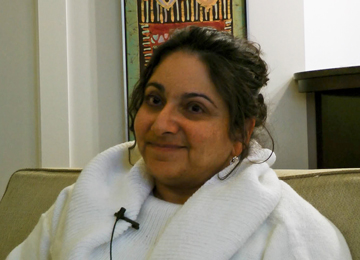Christine

3 years since diagnosis
Age at interview: 53
Christine is married and teaches sociology and political science.
Christine received her diagnosis in 2012. She had never felt or saw anything different about her breast, even though a tumour of about 5 cm was detected during a regular mammogram. After the mammogram, Christine had an ultrasound and 2 biopsies and then heard 10 days later that she had breast cancer in her left breast. She initially opted for a lumpectomy with radiation. When test results showed that she is not a carrier of the hereditary breast cancer gene, but that she has many family members who are carriers, she was advised to consider a full mastectomy. In less than 10 days, Christine moved from deciding to have a lumpectomy, to a single mastectomy, and finally to a double mastectomy with reconstruction. After the initial surgery and reconstruction, Christine developed infections as well as other complications resulting in 10-12 more surgeries. Another surprise for Christine was that she needed chemotherapy even though she had understood that she probably didn’t need further treatment after a mastectomy. It was a challenge for Christine to find the right information on what to do during chemo treatment when you have Type 1 diabetes. She felt that the different professional disciplines could have worked much better together to provide her with the right information. In the end, she found the best support from her diabetic health care team who oversaw her general health during chemo therapy.
Christine had a lot of support from her mother, a cousin and a friend who all helped to care for her during the treatments. She has sometimes heard from others that she dealt really well with her illness. She thinks that because she lives with a number of health conditions, she is able to place breast cancer and the loss of her breast in a different light. This doesn’t mean that it has always been easy for her; she is, for example, experiencing negative side effects from taking Tamoxifen. She feels less healthy now than before her treatments and she doesn’t always remember words as an effect of the ‘chemo brain’. But she has come to terms with her illness and feels at this point anything that might happen to her is just fine. She feels that she can’t be scared anymore thinking about dying after having faced it once and she wonders why she is still alive while others diagnosed with cancer have passed away. She sometimes wakes up in the evening wondering “I am still alive and now what?” She copes by taking life day by day.
More content
- Finding and sharing information – Christine BChristine accessed different kinds of resources to find the information she needed.
- Managing within the health care system – Christine BHaving diabetes and breast cancer was a challenge for Christine and she felt that there was little communication amongst the professionals.
- Positive effects on self – Christine BFor Christine it made it easier both for her to be happy in the present and to accept whatever the future might bring.
- Work and finances – Christine BThanks to her partner's employer, Christine had good medical coverage but would only receive long-term disability after 2 years. Additional costs such as parking were having an impact.